Coronavirus: Group meets over Northern Ireland dental services
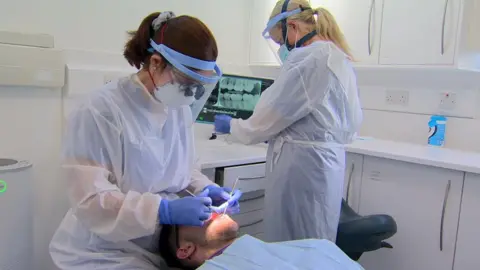 BBC
BBCThe first meeting has been held of a group set up to focus on the rebuilding of dental services in Northern Ireland following the pandemic.
It comes after a warning from the British Dental Association (BDA) in NI.
It says many Northern Ireland dentists are considering pulling out of providing NHS dental care, due to continuing restrictions.
As procedures like teeth cleaning and fillings are "aerosol generating", they are judged a high infection risk.
Dentists have been able to provide routine check-ups, but many procedures mean the surgery has to be left vacant for a period of time to allow any aerosols in the air to settle, before additional cleaning is carried out.
That has drastically reduced the number of patients that dentists are able to see - in some cases, the BDA says, to less than half the number pre-pandemic.
At Mullan Gallagher Dental Care in Downpatrick, County Down, more than half the work at the surgery is NHS dentistry.
Ciara Gallagher, the proprietor, said: "NHS dentistry is a high volume service, so in a practice like ours, a surgeon would see between 20 and 25 patients a day.
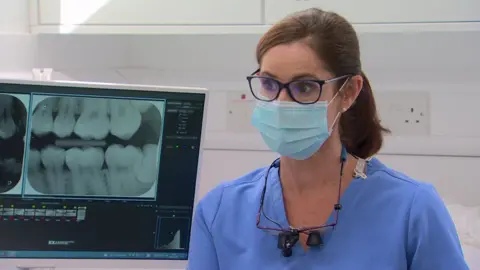
"So during Covid, because of these restrictions and the reduced numbers, we're down to 10, 12 patients per day.
"We've done the numbers, and it's 40% we're managing at the moment.
"We're working flat out every day, but 40% is the most you can do under the restrictions.
"So the queue of people who haven't received their dental care is getting longer and longer and longer."
Dentists like Ms Gallagher say that because NHS dentistry relies on high numbers of patients being treated to increase revenue, the restrictions mean the current model of funding is no longer viable.
She used the example of having a tooth removed under the NHS.
"A dental extraction takes about half an hour, so in a one-hour period we can probably do two extractions," she said.
"The NHS fee for this, plus all the allowances the government do give us, is about £60 for that hour.
"These are my pre-Covid figures, I daren't even run figures just at the moment. But my pre-Covid figures tell me that every room in this surgery costs £65 to run.
"And I haven't paid the dentists.
"So if you're talking about a system that delivers a revenue of £60 an hour and it costs £65 to run, it's not viable."
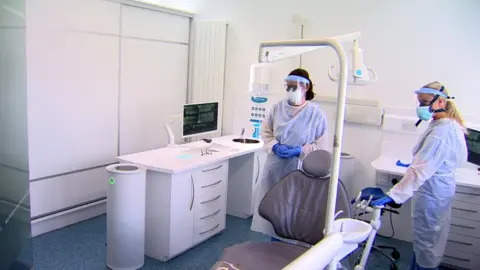
NHS dentists have been supported by the government throughout the pandemic.
In return for that support, dentists are seeing unregistered patients in emergencies and in some cases, opening at weekends. But it doesn't change the infection prevention measures.
Patricia Magee suffered tooth pain at the start of the pandemic and ended up needing a root canal.
"The dental nurses and the dentists were all very gowned up, and I felt safe," she said.
"But in saying that, I could see that there were fewer people in the waiting room and the phone was constantly ringing, so obviously they were under a lot of pressure.
"But I do know that they're waiting for a room for an hour afterwards to then get it sterilised or whatever it is that they do then to make sure it's clean."
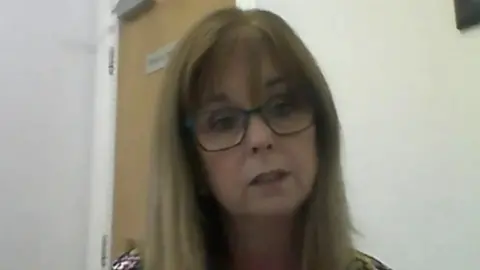
Many surgeries like Ciara Gallagher's use large air purifiers, which are noisy but can reduce the time a room needs to be left vacant to about 15 minutes, before cleaning.
Others have to leave windows open for up to an hour, before cleaning can begin.
A recent survey of dentists in Northern Ireland by the British Dental Association suggests more than half (59%) may reduce their health service commitment over the next year because of the restrictions, and that more than a third (39%) are thinking of leaving practice altogether.
That has patients like Ms Magee worried.
"I don't know how it's going to impact me later on in life, because I'm getting older," she said.
"But my concern would be, I need to maintain my health, the hygiene of my teeth."
Ciara Gallagher is sticking with NHS dentistry. But she's concerned about the patients whose dentists will move to private funding models.
"I have two hats," she said.
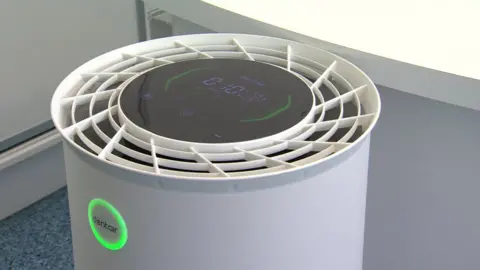
"I own this business and I run this business, and I want it to be a success, and part of that is having enough revenue to reward your staff and reward your team.
"And the other half of it is, I'm a healthcare professional, and if you need me, I need to be there for you regardless of the cost.
"It's a big conflict and it's a big stress, trying to see the way forward out of that.
"But I hope that the government are listening, and we will have an opportunity to sit down and have a conversation about how to deliver good dentistry going forward, for everyone."
